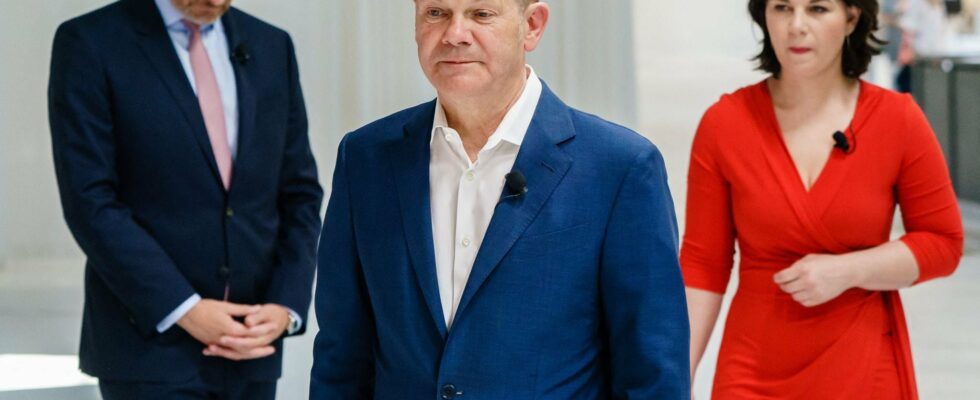Olaf Scholz is not the type to ignite crowds. Your monolithic, marmoreal face, it’s even rather… boring. This March 10, 2023, however, in front of an audience of journalists, the German Chancellor is cheerful. Soon, he announces, the country will experience a new “Wirtschaftswunder” (economic miracle). As during the golden decades (1950-1960). A year later, Germany is in recession and a rain of criticism falls on Scholz. No miracle, therefore, but the worst economic record since the Schröder years. Inflation, energy and housing crisis, demographics at half mast… The indicators are flashing red, even if Berlin, with little debt, retains a financial margin of maneuver that many envy.
We still need to be able to act. “The three parties in power [NDLR : sociaux-démocrates, verts et libéraux] don’t agree on anything, criticizes a keen observer in Brussels. Everything is blocked and will remain so until the federal elections in 2025.” A boulevard for the far right (AfD), which could soon become the second party in the country. Is Germany sick? It is unfortunately our diagnosis and this is very bad news because faced with a bellicose Russia and at a time of a possible return of Trump, Europe, on the contrary, needs a strong Germany.
EPISODE 1 – In Germany, the AfD is ever more extreme and ever more… popular
EPISODE 2 – War in Ukraine: Olaf Scholz, a difficult diplomacy that annoys the Elysée
EPISODE 3 – Failing trains, bridges in poor condition… Germany, a country in need of reconstruction
EPISODE 4 – In Germany, the end of an era in the history of social dialogue
EPISODE 5 – The German economic model is failing… Until when?
EPISODE 6 – Shaken by the war in Ukraine, the German army struggles to transform
Sometimes he feels a pressing need to remind Germans that he is the head of government. “The chancellor is me,” declared Olaf Scholz at the beginning of March to impose his nein to its two allies, the ecologists and the liberals, on deliveries of Taurus cruise missiles to the Ukrainians.
But the Social Democratic chancellor never bangs his fist on the table. Like a teacher who has lost his authority over his students, the chancellor left the field open to his ministers to settle their scores in public. For more than two years, Robert Habeck, the Green Minister of the Economy and Climate, and Christian Lindner, the Liberal Minister of Finance, have taken advantage of this freedom of expression to attack each other through the media.
Three parties in power, so many divisions
It is true that the start of this “coalition of progress”, which came out painfully from the polls in 2019, did not take place under the best auspices. The war in Ukraine changed the situation by completely overhauling the “coalition contract” signed a few months earlier. All infrastructure modernization projects, but also the energy transition, have been called into question by Russian aggression.
Rearmament of the Bundeswehr (the German army), temporary extension of nuclear power, reopening of coal-fired power stations, order of shale gas from the Americans… so many subjects which divided social democratic ministers (SPD), environmentalists (Die Grünen) and liberals (FDP). It is difficult for Scholz to get people who have a very different, or even completely opposed, conception of the State to agree.
When the Greens want VAT on kerosene, 30 kilometer-per-hour zones in cities or the removal of the “debt brake”, the Liberals advocate lower taxes, maintaining unlimited speed on motorways, return to budgetary discipline, the reopening of nuclear power plants and take Europe hostage to impose the maintenance of the thermal engine in Brussels.
The liberal Christian Lindner, at Finance, accuses the “Grünen” of being the “party of bans”. The ecologist Robert Habeck, on the economy, rails against the FDP which “slows down progress” and sabotages the energy transition. “When one says yes, the other says no,” summarizes Frank Baasner, co-director of the Forum for the Franco-German Future in Potsdam.
Politics abhors a vacuum
But the ecologists and the liberals get along wonderfully when it comes to denouncing the silence of their leader on Ukraine and the Russophile nostalgia of a part of the SPD which has for two years been slowing down the delivery of heavy weapons to kyiv. And as the chancellor remains in his ivory tower and is conspicuous by his absence, the two ministers jockey to be caliph in place of the caliph in the news and other political broadcasts. “Olaf Scholz is so passive as Robert Habeck [NDLR : qui n’a pas abandonné l’idée de devenir chancelier] does not deprive itself of taking on the interim role,” notes Markus Linden, political scientist at the University of Trier.
